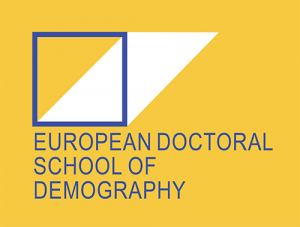Giulia Ferrari
INED will be hosting the European Doctoral School of Demography or EDSD for the coming academic years 2023-2024 and 2024-2025 (November-July).

See our interview with INED Statistical Methods Service research scientist Giulia Ferrari, current EDSD dean.
(Interview conducted in September 2023)
INED will soon take up the role of host institution for the European Doctoral School of Demography or EDSD. What will that role involve?
The EDSD is a top-quality doctoral-level training program for highly motivated students of demography. It is supported by several European Union universities and research institutions, including INED. Every year, 15 to 20 applicants are selected and awarded a full program scholarship for 11 months, during which they live and work in the country that is hosting the school, which changes every two years. INED has already hosted EDSD, from 2007 to 2009, and is now doing so again, on Campus Condorcet, from November to late July of the 2023-2025 academic years. The Institute itself also funds two scholarships for young researchers to attend EDSD.
EDSD students, most of whom are from other countries, receive full assistance for completing administrative formalities and getting settled in France. Once at INED they have access to all Institute and Campus Condorcet resources and facilities. And they play an active role in scientific life at INED, taking part in seminars, workshops, and other Institute events.
INED researchers and research technicians participate fully in the EDSD program, familiarizing program students with the research studies done and cutting-edge research methods developed at the Institute.
Hosting the EDSD program and its students requires close collaboration between several research support services and between researchers, doctoral students, and post-doc fellows already working at INED.
Where do EDSD program students come from and how are they selected?
EDSD students come from a wide variety of places and academic institutions. This year there were 117 applicants of 48 different nationalities. The selection process is rigorous, taking into account academic excellence, motivation, the relevance of the applicant’s proposed research and its potential for advancing demography, as well as applicants’ experience and skill diversity. This approach ensures the training of a talented, diversified cohort. 15 students of 12 different nationalities were selected and will be trained in demography at the EDSD this academic year 2023-2024.
What courses do EDSD students take and who teaches in the program?
The EDSD training program is designed to be complete and interdisciplinary. Students take courses on aspects of demography from international experts with strong reputations in their particular fields. The courses handle subjects ranging from formal and statistical demography to population dynamics, migration, health, family, education, and public policy.
Students also take workshops for developing the “soft skills” essential to demographers, as well as weekly research seminars to facilitate student-teacher exchanges. At INED they can also take a collective French class.
And they are given time to work on their PhD dissertations, notably by writing a research article. Students are required to present their progress on the thesis and to finish the article by the end of the academic year. This practical experience is an excellent opportunity to apply their theoretical knowledge and move forward on their dissertation project. And in doing so, each students receives supervision from an INED researcher, their on-site mentor.
Being an EDSD student also facilitates later scientific collaborations: some former students have done research stays at INED or been hired at the Institute.
In sum, as the EDSD hosting institution, INED offers these students a unique experience: top quality professional training, an international demography researcher network, and precious research resources for pursuing their doctoral theses.
